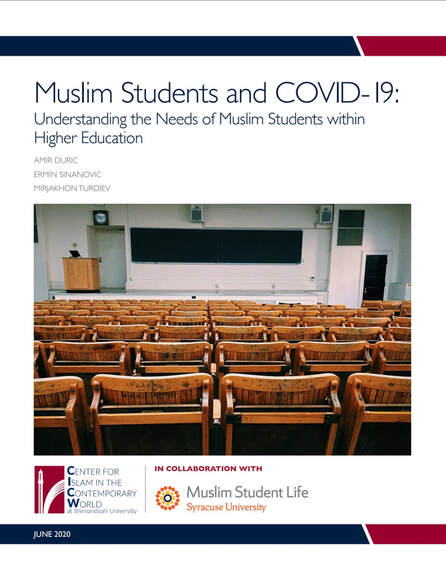Muslim Chaplaincy at Hendricks Chapel Publishes Report on COVID-19 Impact on Student Life
 A new report published by Muslim Student Life at Syracuse University, a chaplaincy within Hendricks Chapel, is increasing awareness about the impact of the COVID-19 pandemic on Muslim college students in the United States.
A new report published by Muslim Student Life at Syracuse University, a chaplaincy within Hendricks Chapel, is increasing awareness about the impact of the COVID-19 pandemic on Muslim college students in the United States.
In collaboration with the Center for Islam in the Contemporary World at Shenandoah University (CICW), Muslim chaplain Imam Amir Durić and Ph.D. student Mirjakhon Turdiev surveyed 498 Muslim college students from 32 states to learn how students were coping with the effects of COVID-19 and how higher education institutions could better serve them.
“After the immediate and intense impacts of COVID-19 swept the country, I was concerned about the effect it was having on Muslim college students who were already vulnerable,” says Durić. “My goal was to conduct proper academic research to gain insights into the contemporary challenges and needs of Muslim students, focusing on specific needs that resulted from the COVID-19 pandemic. We disseminated preliminary findings in April and are now able to share a full report, along with recommendations, with the hope that some, if not all, of these needs will be addressed by institutions of higher education across the country.”
The research findings indicate that the COVID-19 pandemic has impacted Muslim students’ anxiety and academic plans, and has led them to increase the frequency and intensity of their religious practices.
According to the report, Muslim student anxieties have stemmed from a few key areas, including the federal government response to the pandemic, student academic and career plans, and the effects on their ability to worship. Those surveyed reported to have low confidence in the federal government’s response to COVID-19 and have instead turned to their local and state governments, institutions of higher learning and local faith communities.
The timing of the pandemic has been specifically challenging for the Muslim community. The research—conducted just before Ramadan, the holiest month in the Islamic calendar—noted that, for the first time, many Muslim young adults were unable to join in community nightly prayers at their local mosques. This dramatic change in an important aspect of Muslim worship directly impacted students’ mental health, the study found.
Another important finding shows that students who regularly prayed before the pandemic were less likely to experience increased anxiety compared to students who did not regularly pray. While the study authors explained that more research is needed, they say this as a key reason for recommending that institutions of higher education hire Muslim chaplains and proactively support Muslim students.
Other recommendations detailed by the authors include the connection of Muslim chaplains to university health and wellness programs, active communication between chaplains and students throughout the pandemic, and programming tailored to college students at local Islamic institutions.
Mirjakhon Turdiev, a Ph.D. student in the Maxwell School who co-authored the study, says these findings and recommendations will help increase awareness about the value of community life and the mental health of Muslim students and their families.
“I also hope that the recommendations included in the research report will emphasize the significance of more intensive and consistent promotion of diversity and inclusion in higher education systems and structures,” says Turdiev. “This will ensure equal opportunities in accessing health care and social services for all students, especially in times of crisis.”
Other members of the Syracuse University community were critical to this study. Mirza Tihić, a research fellow in the Whitman School and a member of the Muslim Student Life advisory board, assisted with research and helped secure a grant from the Center for Islam in the Contemporary World at Shenandoah University (CICW). Ermin Sinanović G’02, executive director of CICW and a Maxwell School alumnus, co-wrote the study.
Durić says he is grateful for the support of Sinanović and CICW, as they were essential to the study’s success.
“I hope to continue this collaboration, as there is a tremendous need for additional data and insights from Muslim students to improve their overall student experience and inform the efforts within diversity and inclusion, religious and spiritual life, and student affairs offices,” says Durić.
Access the full report, titled “Muslim Students and COVID-19: Understanding the Needs of Muslim Students within Higher Education,” is available at contemporaryislam.org.
For more info, click here.

